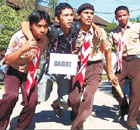Op-Ed Contributors
Powerful people make war, ordinary folks suffer
By Ma Chao (China Daily)
Updated: 2009-12-25 07:49
 |
Large Medium Small |
Three decades after the erstwhile Soviet Union's tanks rolled into Afghanistan, another superpower is struggling to bring "stability and order" in the country.
The US story is not very different from the Soviet's. On Dec 27, 1979, the Soviets invaded Afghanistan with thousands of troops, tanks and armored vehicles to fight Islamic rebels (Mujahideen). Within a week, they had reached the border with Pakistan and taken control of all the major cities and traffic arteries.
Leonid Brezhnev, then head of the Soviet Union, believed his army would take control of the whole country and stabilize security in three to four weeks. He would then hand over the country to the Kabul government and his troops would return home triumphantly. The Soviets, however, didn't leave the country till seven years after his death in 1982.
| ||||
But the US success, like the Soviet's, has been confined to the initial phase. Though the Taliban have been driven out of Kabul, their writ still runs large across the vast land, especially in rural areas - some estimates say they control 72 percent of Afghan territory.
Military actions against the Taliban have been largely futile. The number of casualties in the US and allied forces is growing. To reverse the trend, US President Barack Obama has decided to send reinforcements. By summer, the US will have almost 100,000 troops, close to the 118,000 Soviet soldiers at their peak in 1985.
Despite the military success in the beginning, the Soviet army gradually found itself mired in a bloody endless war. Though the Soviet and Afghan government forces controlled large cities, the majority of the land, up to 80 percent, was in the hands of the Mujahideen, says Jia Lei, a researcher in military affairs. The Soviets and the Afghan military launched numerous assaults against the Mujahideen but were never able to contain the insurgency.
The Soviet troops were part of one of the most powerful land forces in the world. Despite that they could not navigate Afghanistan's mountains and valleys, because they were equipped and drilled for regular warfare and grand-scale mechanized battles, says Chen Xuehui, a researcher on military history at the PLA Academy of Military Science. The Mujahideen's guerrilla warfare spelled the doom for the Soviet and Afghan forces.
Frustrated, Soviet forces bombed villages that supported the insurgents. This only served to make the rebels more determined to fight the Soviets; something that we are seeing now against the US forces.
Like the Soviets, the US troops are equipped with much more advanced weaponry than their enemy, but they have met with little success. Drone bombings, aimed at destroying Taliban bases, have killed innumerous civilians and further incited anti-US sentiments among the Afghan people.
Futile Soviet measures
The Soviet Union tried political and economic measures, too, to establish control. It helped the Kabul government to train civil servants, soldiers, secret police and intelligence staff. It built public buildings and infrastructure in the territories under its control, and launched a massive propaganda campaign. But even those measures did not reverse its fortunes. Afghan government forces deserted or defected to the Mujahideen. Officials sold Soviet supplies to the Islamic fighters, and people in the occupied areas helped the insurgents to sneak in and out of cities. Many war-weary Soviet soldiers, especially those from Soviet Central Asia, deserted their units, and a few even joined the Mujahideen.
The US, too, has poured in huge amounts of money to rebuild Afghanistan. But Kabul government officials have pocketed a large percentage of those amounts, while most of the Afghans continue to live in destitution. Like the Soviet Union, the US has tried every possible tactic - from spying and rule to bribery and propaganda - to exercise control. And, like the Soviet Union, it has failed.
The mountainous terrain and the tribal social structure of Afghanistan are not the only factors that have kept invaders at bay. What many people don't know is that Afghanistan is one of the oldest civilizations in the world (it's part of the Indus Valley and Vedic civilizations which spread across present-day Pakistan and India.) The Afghans have been subjugated by religions - from Zoroastrianism, Hinduism and Buddhism to Islam - but not at the expense of their freedom and social practices. Even the most faithful of the Muslim is rooted in his tribal practices. From Alexander the Great to the British and Russian (and Soviet) rulers, none has been able to rule over them for long. The Soviets didn't realize this. Nor have the Americans.
Like the Soviet Union, the US has committed a blunder - that of ideological arrogance. It is confident of the supremacy of its political and economic systems, and believes they can be replicated in Afghanistan, which will help it to set up a friendly government so that terrorism can be "crushed at source".
The Soviet military failure (and the huge drain on its resources) forced former Soviet president Mikhail Gorbachev to think of withdrawal in 1985. He increased the number of Soviet troops to contain insurgency in order to ensure an honorable withdrawal. But the strategy didn't work, and ultimately the Soviets had to pull out in disgrace. The Soviet Union lost more than 13,000 troops, and was left to tend for over 35,000 wounded and 470,000 sick.
Now it seems Obama has given up the dream of his predecessor George W. Bush, and would prefer retreating with honor. But judging from the Soviet experience, the chances of that are remote.
The Soviet invasion left a devastating legacy in Afghanistan: More than 1 million people died, a quarter of the population became refugees, and the entire country fell into a ruinous civil war, paving the way for the Taliban to seize power. No exact casualties' figure is available in the US invasion, but tens of thousands of civilians have reportedly been killed since 2001 and the country has been devastated further. So when the Americans withdraw - if they do at all - they will once more leave behind ordinary people to suffer the misery of a misplaced war.
(China Daily 12/25/2009 page9)












